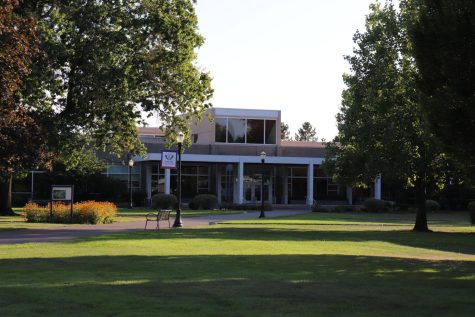What’s up with Linfield Outsourcing Title IX?
October 18, 2022
Editor’s Note: Dean of students, vice president of student affairs, and deputy Title IX coordinator, Jeff Mackay, could not be reached to comment on this story.
One of the important parts of administration a school needs to have covered is Title IX.
At a small private school like Linfield, it is up to the governing body of the school to make sure there are people working on all the small parts of administration so the University can function as a whole.
Title IX, as a whole, prohibits sex-based discrimination in educational programs that receive funding from the federal government. As Linfield is one of the numerous universities across America that receives funding from the federal government, Title IX is required to be enforced at Linfield.

Under laws set by the U.S. Department of Education, many action steps must be taken to fully enforce Title IX. But, the sum of what schools must do to enforce Title IX seems simple enough.
According to the U.S. Department of Education, “Title IX requires schools to adopt and publish grievance procedures for students to file complaints of sex discrimination, including complaints of sexual harassment or sexual violence.”
This task seems simple enough, as universities across America all have generally similar systems in place to handle Title IX issues. In the past, Linfield had a system in place to handle Title IX issues as well. So what led Linfield to get rid of the current system and outsource the issues instead?
For anyone who’s been involved in the Linfield community in the past five or so years, the answer seems obvious: Linfield administration has been struggling on the Title IX front.
In 2020, The Linfield Review reported on the sexual assault of a student by a board member that occurred in 2019. In fact, in 2020 The Linfield Review created an entire sexual misconduct section on their website due to the high volume of stories being reported on the sexual misconduct at Linfield.
If you are new to the Linfield community and want to be informed on previous improper handling of Title IX cases in the past, refer to the Linfield Review’s sexual misconduct section which won the Linfield Review a national award.
Not free from the spotlight by a longshot, though, Linfield had its share of problems from the sexual misconduct cases in 2020 bleed into 2021. In 2021, Linfield made it into stories from The Oregonian, KGW8, OPB and many others in regards to sexual assault allegations and the firing of a professor who spoke up about them.
But I’m not here today to rehash the arguments that have been buzzing around campus for the past three years about Linfield’s poor handling of sexual assault allegations and their lack of understanding for those victim to sexual assault on their campus.

I’m here to look at what seems to be Linfield’s final solution to all the struggles they’ve had handling Title IX in the past year: make it someone else’s problem.
On August 30th of this year, Jeff Mackay, the Vice President of Student Affairs, Dean of Students and Title IX Deputy Coordinator sent out an email to all Linfield students announcing that: “Linfield will be utilizing outside professionals from Grand River Solutions for the institution’s Title IX/Sexual Misconduct compliance support.”
He continued on in the next sentence listing a few other private universities Linfield’s size who utilize Grand River Solutions as well, almost as an instant defense of the action the school is taking.
The bulk of the email goes on informing the students that Grand River Solutions is now handling all all issues related to Title IX compliance and will lead investigations and hearings on all Title IX and sexual misconduct complaints. Grand River has also provided a staff member who is serving as Linfield’s interim Title IX coordinator and will work with the team of Title IX deputy coordinators.
Grand Rivers Solutions boasts many services and gives the main goal of their services as “lowering the cost of compliance.” They tailor services specific to a school’s situation and the support is customized to what the school needs most help in. They claim “One campus at a time, we help to create lasting institutional, individual and community transformations.”

A positive going for Grand River is that they have a very diverse staff and upper management. In the “about” section of their website they have a subsection discussing how they value diversity.
“Understanding, recognizing, and addressing the impact of discriminatory bias is at the heart of our work. We stand in support of equity and against harassment and discrimination in all its forms.” The Grand River Solutions ‘Diversity Matters’ section states.
They share on their website that the benefits from using Grand River Solutions include practical experience, collective expertise, impartiality, and affordable solutions.
Written out, it does feel that the university will benefit from using Grand River Solutions.
But what led the Linfield administration to making this choice? Was it because the school wanted to give students the proper help and experience when reporting misconduct or dealing with Title IX issues? Or is it because the Linfield administration became tired of constantly being under fire for their struggles with handling Title IX related events?
One would hope that the choice was made with student wellbeing in mind. It may even be a bit of both, and Linfield felt they could save face and have a better system for students while also avoiding having to do the brunt of the work regarding Title IX.
But it does make you wonder, is Linfield copping out with this action? Are they saying, we’re tired of dealing with all the sexual misconduct reports and Title IX rules, we’ll let someone else handle it?
We may never know the true intention behind bringing Grand River Solutions in, though we can speculate forever. All we can hope is that the decision Linfield made is the right one and that it will help the student body in the long run.
